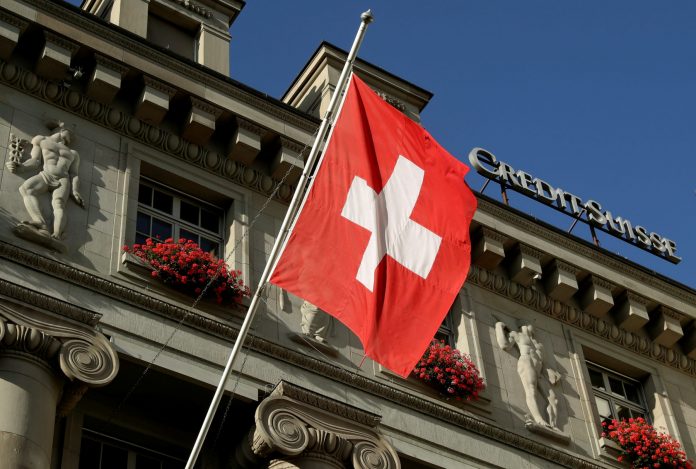KARACHI: Pakistan’s fundamentals have ‘improved significantly’ but the ‘challenges’ still lie ahead, Credit Suisse- a Swiss financial services firm- says in its latest report.
Titled “Pakistan: On the path to recovery”, the firm credits ‘assistance from the International Monetary Fund (IMF)’, ‘fiscal consolidation’, and ‘much needed reforms’ for the improvement in the country’s economic situation.
“In near term, we expect equities to remain range-bound after a strong rally, but the long-term upside potential remains significant,” the Zurich-based firm said in its report.
The firm added that it was also expecting the State Bank of Pakistan (SBP) to slash interest rates in the range of 100 to 200 basis points in the second half of this year as the IMF-driven rupee stepped back to stability path.
The financial services firm says it seems too early for a rate cut and it believes the SBP will most likely await firm signs of disinflation before doing so”.
“In addition, real rates remain low implying limited pressure for rates to be reduced in the near term,” it said.
“We believe Pakistan’s rate cuts are weighed toward H2 given that inflation has yet to peak and the SBP would likely wait for 2–3 months of disinflation before considering rate cuts. We believe the central bank is likely to cut rates by 100–150 bps.”
Credit Suisse also pinned hope on IMF-backed reforms saying those were injecting a dose of stability into the battered rupee that resiliently recovered four per cent following the loan program.
“We expect the Pakistani rupee to remain stable and going forward, supported by Pakistan’s commitment to the Extended Fund Facility (EFF) program,” it said in the report authored by the firm’s Head of Middle East Research, Fahd Iqbal.
In July last year, Pakistan agreed to IMF’s $6 billion worth EFF program to overcome its balance of payments crisis.
“A continuation and improvement in this trend could support a modest overshoot on the real effective exchange rate (REER),” Credit Suisse said with reference to the positive progress of IMF’s assessment on its EFF in Pakistan.
“We note that a move in the REER back to 105 (in line with levels seen prior to 2014) would correspond to a further 2–4pc appreciation in the PKR, according to our estimates,” it added.
Credit Suisse said the rupee had had become extremely overvalued, as measured by the REER prior to devaluations.
“The policy to weaken the PKR aggressively erased the overvaluation completely and in fact left the currency looking historically cheap,” it said. “The appreciation since then has neutralised the PKR’s valuation.”
Pakistani rupee was devalued by around 33pc from December 2017 to July 2019, in parallel with the sharp increase in base rates.
“Most of the devaluations were undertaken in a series of 5–6pc steps and occurred against the backdrop of the government’s negotiations with international donors to bridge its estimated $12 billion financing gap,” Credit Suisse said.
“The run-up to the EFF approval saw a disorderly weakening of the PKR by a further around 15pc, which the firm believes was driven by moves to comply with the IMF’s final prerequisites for the funding arrangement.”
The foreign company drew the analogy for this from Egypt where, it said the central bank governor was previously the IMF’s senior representative and he oversaw similar policy initiatives. But, it said Pakistan had to devalue rupee in a disorderly manner in the run-up to IMF’s loan program.
“Importantly, however, the approval of the EFF arrangement triggered a slow and steady four percent appreciation in the PKR, with extremely low levels of volatility,” it said.
“In our view, this points to the currency being brought back under control and suggests limited downside risk, going forward.”
Credit Suisse said the rupee has stabilised after a lengthy period of depreciation and foreign investors have started to take notice, with portfolio inflows sharply accelerating over the past six months.
The financial services firm further said equities are likely to remain range-bound after a strong rally, but the long-term upside potential remains significant.
“As the PKR has stabilised, and there is potential for further modest appreciation, we believe the carry trade offers a compelling risk/reward opportunity and recommend short duration t (treasury)-bills.”
Credit Suisse, however, said a key drawback for international investors is low liquidity in the index.
“The primary risk for investors is the potential for a renewed devaluation,” the reports added.
“However, with Pakistan still at the early stages of an IMF program, and the build-up in reserves ahead of expectations, we believe this risk is low. Indeed, as we mentioned earlier, we see the potential for a further modest revaluation in the PKR,” Credit Suisse concluded in its report.




